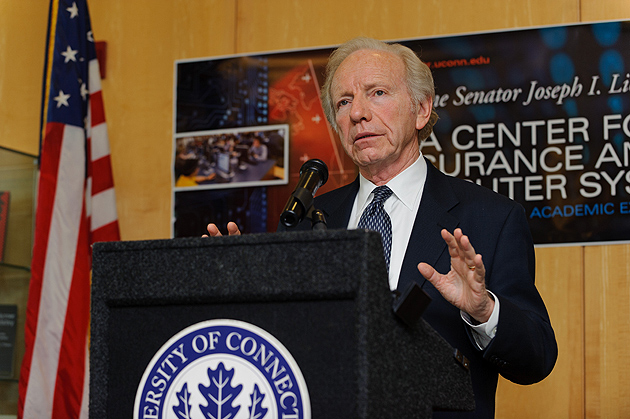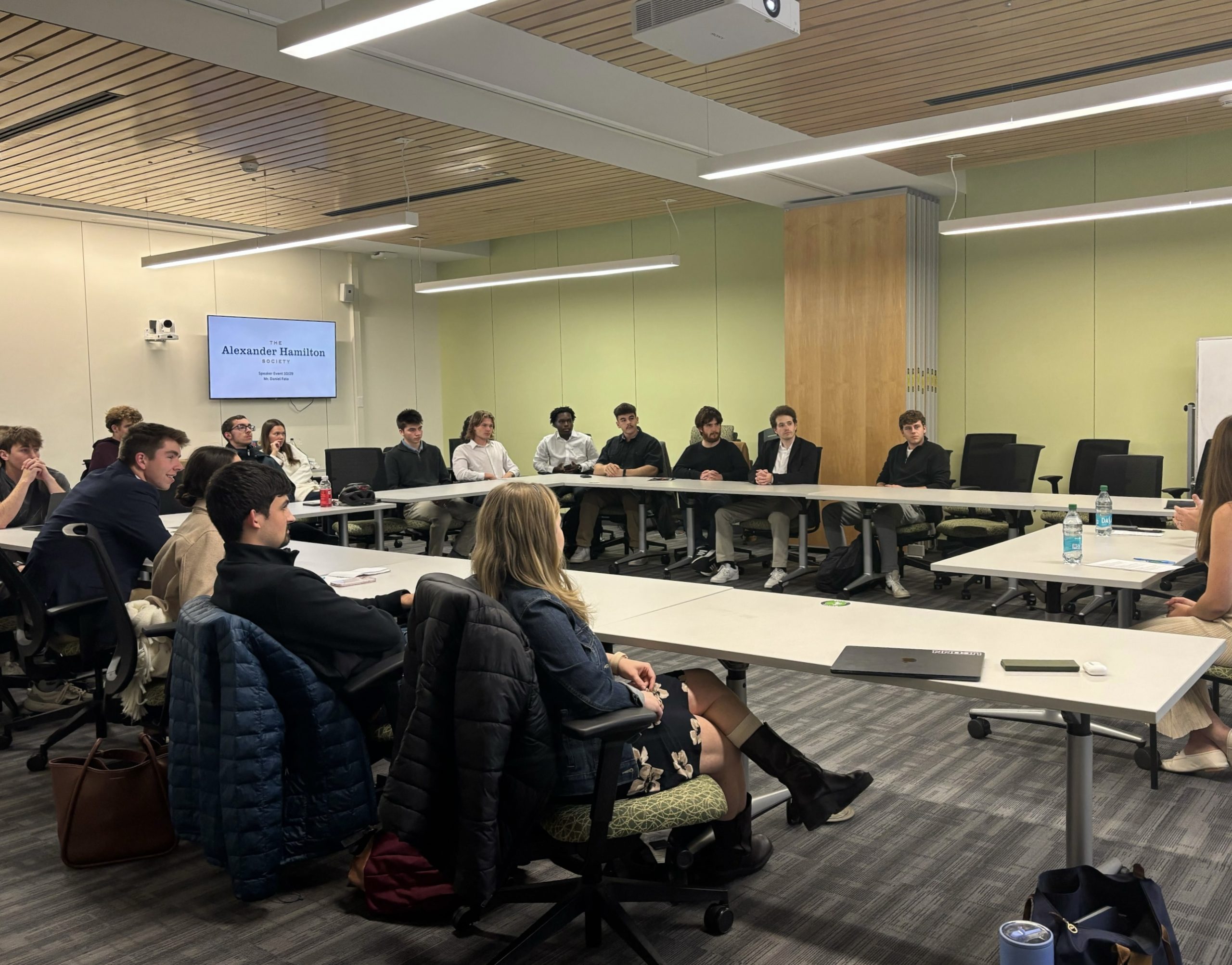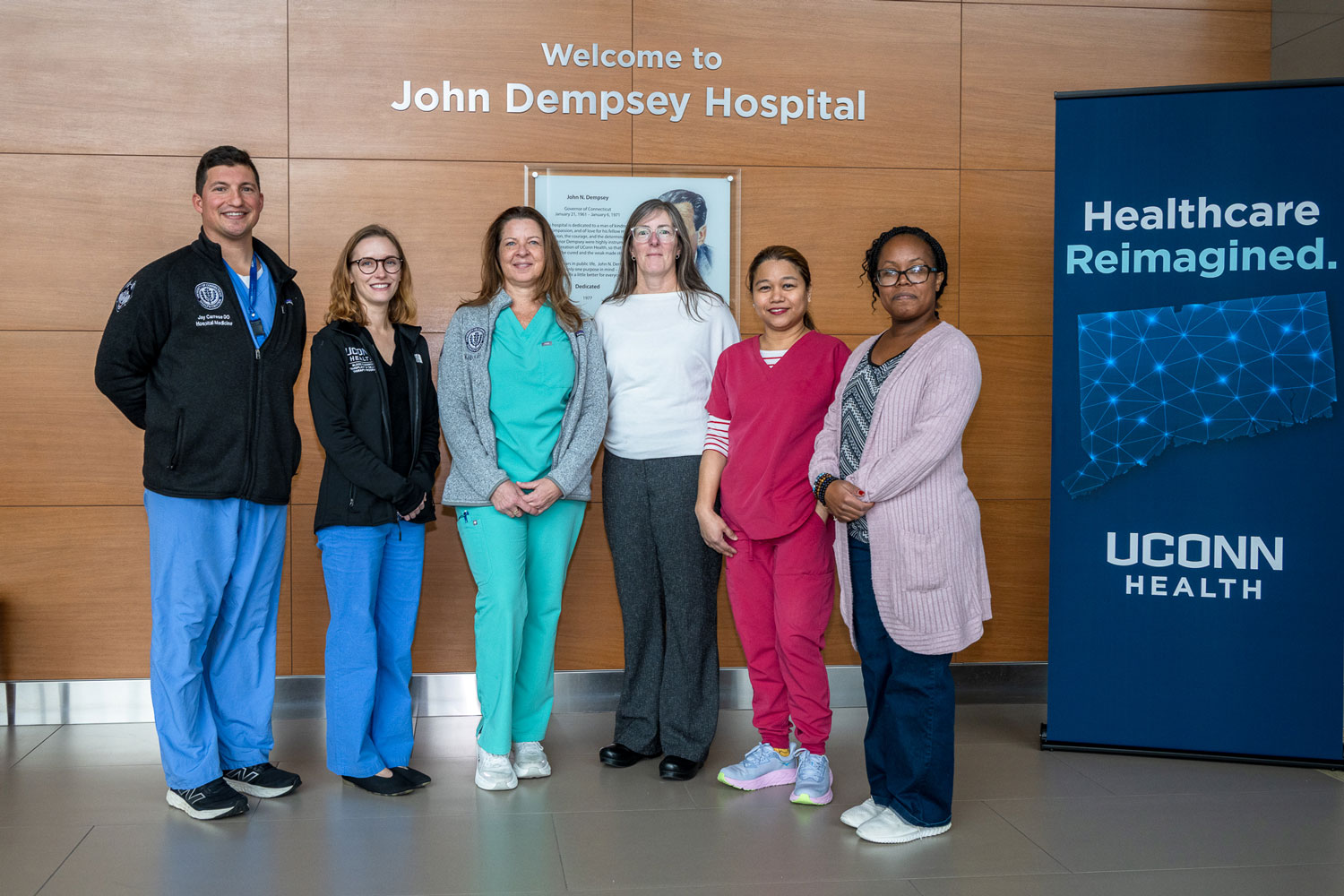
U.S. Sen. Joseph Lieberman visited the Storrs campus Thursday to promote new legislation aimed at protecting the country’s vital infrastructure from crippling cyber attacks by terrorists, rogue individuals and hostile nation-states.
Lieberman chose UConn to discuss the bipartisan Cyber Security Act of 2012 because of the University’s leadership in developing advanced technologies to identify and protect against cyber security threats.
More than 20 faculty members and over 100 graduate students in the Schools of Engineering and Business are currently conducting cyber security research through UConn’s National Security Agency Center for Information Assurance and Computer Systems Security or CIACSS located in the Information Technologies Engineering building. Supported by more than $2 million in federal grants, the researchers are generating better encryption algorithms, developing more secure models for cloud computing, and working on innovative ways to quickly identify counterfeit computer chips.

Lieberman said the Cyber Security Act, which he co-sponsored as chairman of the Homeland Security and Government Affairs Committee, provides for the creation of a cyber security research and development program to help promote new technology, software, and analytical tools much like what UConn is working on. He said the nation needs to act now to prevent a “Cyber 911.”
“Terrorist groups are developing the capacity to attack us by attacking, not government sites, although they will probably try to do that too, but by attacking the kind of facilities that in other wars were attacked from the air or ground,” Lieberman said. “I’m talking about electric power systems, water systems, financial networks, and the transportation networks of our country. This has created a vulnerability that we have not yet met.”
UConn’s strength in cyber security research led it to be named a National Center for Academic Excellence in Information Assurance Research in 2010. The program is overseen by John Chandy, an associate professor of electrical and computer engineering. Chandy says the research team involves many members of the departments of electrical & computer engineering, computer science & engineering, and operations & information management in the School of Business. The designation allows the University to vie for a variety of scholarships and fellowships offered by the Department of Defense, Department of Education, National Science Foundation, and others.

Other areas that UConn researchers are focusing on include secure voting technology, hardware Trojans, data mining, and access control and authorization.
“One of our areas of research is trustable computing systems,” said Chandy. “Can you trust the chips that you use? Can you trust that they will implement what you’ve designed them to do? Can you trust that there is no hardware on them that will cause problems? It is great to hear that Sen. Lieberman has included research money in the new bill, and hopefully we can tap into some of that research money here at UConn.”
Engineering dean Mun Choi said, “Cyber security has truly become a global threat to communications networks, to utilities, to financial institutions, and to national defense. The threats can arise from rogue individuals to nation-states. It is estimated that on an annual basis there are more than 100,000 cyber attacks on the U.S. national defense.
“At UConn, our NSA Center of Excellence brings together faculty from the School of Engineering and the School of Business among others to develop advanced detection, prevention, and deactivation technologies to ensure that our freedoms – ranging from communicating to tweeting to voting – remain secure,” he added. “It is a privilege to work with Sen. Lieberman in meeting this very important need that is going to grow over the years.”
Dismantling the Silicone Time Bomb
After announcing his proposed Cyber Security Act legislation before a group of students, faculty, and staff in the ITE building, Lieberman toured some of UConn’s cyber research labs.

Associate professor Mohammad Tehranipoor’s lab has been working on better ways to identify counterfeit integrated circuits and hardware Trojans. Tehranipoor told Lieberman that the recycling and reprogramming of integrated circuits is a multibillion dollar international industry that poses a constant threat to the nation’s infrastructure and national security.
“We call it a silicone time bomb,” Tehranipoor said, showing Lieberman an array of innocuous-looking black computer chips, some of which had been tampered with and some that hadn’t. “What you have is a missile in there, and someone can blow it up.”
“Fascinating. That is a great service,” Lieberman said, visibly impressed. Turning to the group of student researchers assembled in the lab, he added, “You really are on the new frontier. When I was growing up, President Kennedy said we are at the new frontier; but you are really at the new frontier today, both in terms of innovation, economic activity, and security. So thank you for what you are doing!”


